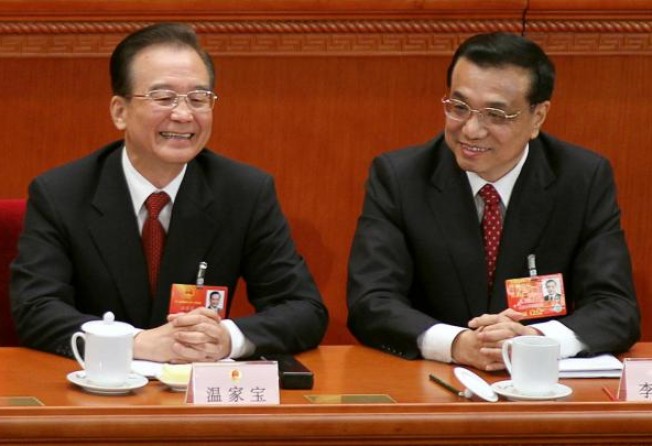
China to hike budget deficit to 1.2tr yuan to stabilise growth
Ministry of Finance plans 50pc spending increase to record 1.2tr yuan, as outgoing premier warns of graft and social inequalities

China's incoming government will run a record budget deficit this year, underscoring its commitment to boost spending on social welfare and stabilise economic growth.

That represents a 50 per cent jump on last year's 800 billion yuan deficit, which was about 1.5 per cent of GDP. Most major developed countries run much higher deficits.
Besides running a record-high budget deficit, the economic tasks facing the new cabinet also include maintaining a GDP growth rate of 7.5 per cent, keeping inflation steady at 3.5 per cent and guarding against financial risks to make growth more sustainable, something stressed by outgoing Premier Wen Jiabao in his last work report.
"It is necessary to increase spending to ensure and improve people's well-being and maintain support for economic growth and structural adjustment," Wen said.
It is necessary to increase spending to ensure and improve people's well-being and maintain support for economic growth and structural adjustment
Economists said the record deficit would enable the government to focus spending on public welfare and launch further structural tax cuts to spur demand.
Ting Lu, chief China economist with Bank of America Merrill Lynch, said the fiscal deficit target confirmed a "proactive" fiscal policy and should be welcomed.
Wei Yao, China economist with Societe Generale, said: "This is supportive to pro-consumption expenditures (social security, health care and education), but not necessarily conducive to credit-fuelled public investment."
Qu Hongbin, co-head of Asian economic research at HSBC, said he expected GDP growth this year would actually exceed the government's target and come in at 8.6 per cent.
"Given external uncertainties, Beijing will make preservation of domestic demand growth a priority for this year." Qu said.
"In our view, this year will also be special as the new leadership taking office from March will want to see China's growth recovery through to the end, rather than for it to dip back into another cycle of deceleration."
In his swansong work report, Wen also detailed a range of social and economic problems bequeathed to the incoming cabinet, which will be led by his successor, Li Keqiang .
Wen warned incoming leaders of increasing "social strains" in the uphill battle to fight corruption, narrow the wealth gap and reduce social inequalities. He singled out as particular ills "unbalanced economic development, income disparity and inequalities dividing urban and rural residents".
"We are keenly aware that we still face many difficulties and problems in our economic and social development," Wen told nearly 3,000 NPC deputies in the Great Hall of the People.
There was a special warning for the new leaders on the environmental consequences of growth, with Wen saying that growth must take note of resource capacity and the environment.